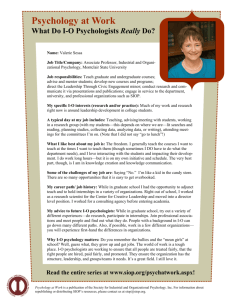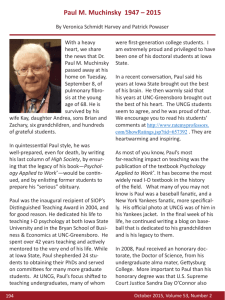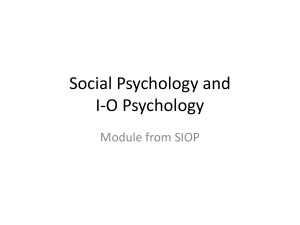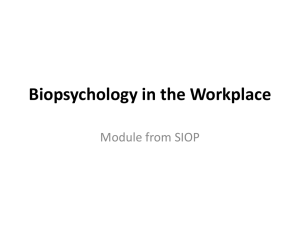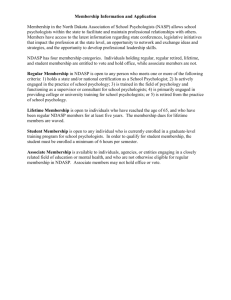Defining the Profession of Industrial
advertisement
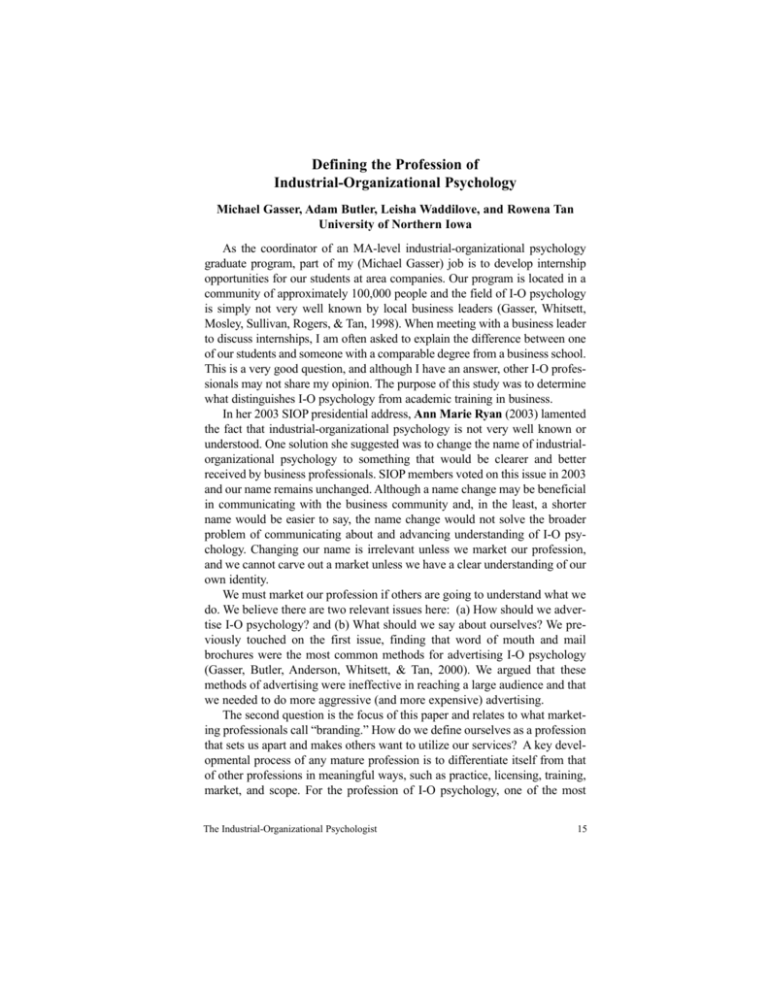
Defining the Profession of Industrial-Organizational Psychology Michael Gasser, Adam Butler, Leisha Waddilove, and Rowena Tan University of Northern Iowa As the coordinator of an MA-level industrial-organizational psychology graduate program, part of my (Michael Gasser) job is to develop internship opportunities for our students at area companies. Our program is located in a community of approximately 100,000 people and the field of I-O psychology is simply not very well known by local business leaders (Gasser, Whitsett, Mosley, Sullivan, Rogers, & Tan, 1998). When meeting with a business leader to discuss internships, I am often asked to explain the difference between one of our students and someone with a comparable degree from a business school. This is a very good question, and although I have an answer, other I-O professionals may not share my opinion. The purpose of this study was to determine what distinguishes I-O psychology from academic training in business. In her 2003 SIOP presidential address, Ann Marie Ryan (2003) lamented the fact that industrial-organizational psychology is not very well known or understood. One solution she suggested was to change the name of industrialorganizational psychology to something that would be clearer and better received by business professionals. SIOP members voted on this issue in 2003 and our name remains unchanged. Although a name change may be beneficial in communicating with the business community and, in the least, a shorter name would be easier to say, the name change would not solve the broader problem of communicating about and advancing understanding of I-O psychology. Changing our name is irrelevant unless we market our profession, and we cannot carve out a market unless we have a clear understanding of our own identity. We must market our profession if others are going to understand what we do. We believe there are two relevant issues here: (a) How should we advertise I-O psychology? and (b) What should we say about ourselves? We previously touched on the first issue, finding that word of mouth and mail brochures were the most common methods for advertising I-O psychology (Gasser, Butler, Anderson, Whitsett, & Tan, 2000). We argued that these methods of advertising were ineffective in reaching a large audience and that we needed to do more aggressive (and more expensive) advertising. The second question is the focus of this paper and relates to what marketing professionals call “branding.” How do we define ourselves as a profession that sets us apart and makes others want to utilize our services? A key developmental process of any mature profession is to differentiate itself from that of other professions in meaningful ways, such as practice, licensing, training, market, and scope. For the profession of I-O psychology, one of the most The Industrial-Organizational Psychologist 15 important goals of branding is to show that we are different from a professional with an HR degree out of a business school. Otherwise, why not use them instead? In fact, why even have I-O psychology as a separate profession? The participants in this survey were the 215 Fellows of SIOP that appeared in the 2003 SIOP Directory. We used Fellows as our participants because, typically, they have been in the profession for more time and have been more active in SIOP affairs than most I-O psychologists. In effect, we considered them to be experts in the field. We created an e-mail list that included 196 Fellows that had recorded e-mail addresses. We sent an e-mail message to the Fellows on this list that invited each of them to participate in a brief survey and provided a Web linkage to that survey. The survey asked for basic demographics: gender, age, years since receiving PhD, and location of employment. After the demographic questions, one open-ended question asked: “Generally, how are industrial-organizational psychologists different from their business school-trained counterparts with the same amount of education?” Of the 196 Fellows included in the e-mail list, two of the addresses were undeliverable. Of the 70 respondents to the survey, 55 were male, the mean age was 56.9 years, and an average of 30.3 years had passed since receipt of the PhD. Twenty-two of the respondents reported their main place of employment was a psychology department, 32 reported a business school as their primary employer, 9 indicated they were primarily consultants, and 7 respondents were in the “other” category. Each researcher independently examined the open-ended responses provided by the Fellows and sorted each stated difference into categories. The categories that emerged from this sort were compared across researchers. We retained those categories that emerged for all four researchers. The method of analysis used is obviously subjective, as would be any coding or sorting method we chose to use. Given the inherent subjectivity of this process, we felt that it was especially important to make the raw data (the actual responses we received) easily available. We removed identifying information from the responses, but we did not otherwise edit them. We posted the responses as a downloadable PDF file at www.uni.edu/psych/grad/io/io_info.shtml. We believe that the raw responses of the Fellows are a rich resource for survey developers and generally of interest to the reader. The following categories of differences emerged: 1. I-O psychologists have a greater familiarity with science and research. I-O psychologists have more training in statistics and a correspondingly enhanced ability to think of problems from a statistical perspective, meaning that they are less likely to be persuaded by anecdotal evidence or the testimony of experts. I-O psychologists are more knowledgeable about measurement and are more likely to look at performance as the behavior of an employee, rather than the outcome. I-O psychologists know how to conduct good research designs and are more likely to use empirical data collected in 16 October 2004 Volume 42 Number 2 an experiment as a way of knowing rather than experience and case studies. During their training, I-O psychologists are more likely to conduct research along with their coursework and experience greater involvement in research activities under the guidance of a mentor. In essence, I-O psychologists know how to think like a scientist. 2. I-O psychologists have a greater understanding of psychological theories and human behavior. I-O psychologists attend a core set of courses that reflect basic areas in psychology, such as social, personality, developmental, cognitive, physiological, and experimental. HR professionals that are business school trained take the business core classes, such as accounting, economics, compensation, legal topics, and finance. The focus of the I-O psychologist is on people and understanding human interactions, whereas the focus of a business school-trained HR professional is on economic and organizational outcomes. In effect, I-O psychologists know how to think like a psychologist. 3. The focus of I-O psychologists is typically at the microlevel; the focus of the business school HR professional is at the macrolevel. This difference is related to the difference described in the previous category and can be seen as an extension of the core coursework in each profession. I-O psychologists are more interested in an intervention’s effect on variables at the person level, such as improvements in job performance behaviors, work motivation, job satisfaction, and organizational commitment—the human experience of work. HR professionals are more interested in variables at the organizational level, such as profit, productivity, turnover, and investment outcomes. I-O psychologists are more interested in people and base their efforts on a theoretical understanding of why people do what they do. 4. There is no difference or only a very small difference between the two professions. Several respondents commented that no real difference between the two professions exists or that if any difference did exist, it was very small. Conclusion The authors hope this paper provides a glimpse of what prominent I-O psychologists think about the difference between the two professions in question: I-O psychology and HR professionals from a business school. The responses we obtained provide guidance for the development of future surveys that are more objective, quantitative, and use a closed-answer format. Many respondents ascribed importance and a certain amount of pride to our identity as psychologists. We see two important implications emanating from this perspective. 1. We are scientists. We are trained to be scientists. This means that we have a responsibility in our practice to utilize the scientist–practitioner model. For example, an I-O psychologist should take the time to convince a manager who wants a solution right now, and is satisfied with a solution if it looks like it should work on a surface level, that good science is a better The Industrial-Organizational Psychologist 17 choice in the long term. We should use empirical means to collect data so that we know if an organizational intervention has been successful or not. Further, we should rely on good research design to tell us about success and not anecdotal comments or managerial testimony. Further, being a scientist also means that we are debunkers. We have the responsibility to organizations to find out what really works and to debunk bogus claims from purveyors of business interventions. • Do slogan-based posters have any motivational effects? • Does the FISH training program work? • Does training based on Steven Covey’s theory work? • Do wilderness team-building exercises work? As these claims and products come up, we need to subject them to empirical scrutiny and inform the decision makers in a business about the product’s ineffectiveness if it does not stand up to that scrutiny. Products like this cost corporations millions each year. One of the major services that I-O psychology and SIOP could offer as part of its outreach to business is to test these claims and then to educate managers about what does not work and what does work. Finally, as scientists, we are developers of theory for good practice. This is because we base the development of our theories on empirical research and we further refine our theories with additional research. Often, in the business school model, this does not happen. Organizational theories sprout that have no basis in existing research and are never tested—or are even untestable. Truly, they are more philosophical in nature. As scientists, we should promote the use of empirically based theory. As has been said, there is nothing more practical than a good theory. 2. We are psychologists. This implication incorporates Categories 2 and 3, namely that we have a better understanding of psychological theory and we are more focused on microlevel analysis. As psychologists, we understand theories about human behavior and our focus is on the person level. Our primary goal is to improve the human condition at work. As opposed to business, where the focus is more often on initiating cost-saving measures, often at the expense of employee satisfaction, motivation, and performance in the workplace. Although the interventions and person-level variables that I-O psychologists focus on often have significant financial importance, we argue that improving the human condition at work is the correct goal for us to pursue given our background as psychologists and the unique training we receive. The challenge will be in finding a suitable way to market our focus on the human element that is meaningful to members of the business community. Sometimes, among I-O psychologists and graduate students studying the profession, there is the perceived need to become more business-like, to take more business classes so that you know the terminology and points of practice. There is, sometimes, a lack of recognition by ourselves of what we, as psychologists, can offer an organization. As psychologists, we have a very 18 October 2004 Volume 42 Number 2 valuable set of tools for defining, understanding, and solving organizational problems that focus on humans and human behavior. Surprisingly often, taking the human element into consideration is neglected in business. As examples, managers and executives will miss the importance of basic human psychological needs, such as asking their employees for their opinions regarding a change before putting it in place, mandating change rather than developing opportunities for employees to feel ownership for a newly installed program, and ignoring the importance of feedback in the effectiveness of performance appraisal. When morale and job satisfaction plummet as a result of not taking the human element into consideration, the problem is seen by these managers at the level of high turnover, which they try to fix with a better compensation model. The human element never enters the equation. We should not underestimate the value of those core psychology classes. Our understanding of the human element and how to incorporate that into the work environment is a unique skill that our profession has to offer. Caveats and Concerns An important caveat to make about the points of distinction we have mentioned is that truly, they are a matter of degree rather than absolutes. At least in the past, business schools made a practice of hiring I-O psychologists onto their staffs and many of the Fellows that provided the responses in this survey noted that they were academics in business schools and sometimes in both psychology departments and business schools. In some business schools, the training received is nearly equivalent to an I-O psychology program. In other schools, the training will be very different. Although the differences between I-O psychologists and business school-trained HR professionals are in shades of gray, rather than black and white, they are still discernable. Clearly, the methodology and analysis we used for this paper is less rigorous and more subjective than a factor analysis or other statistical data reduction technique that uses quantitative survey data. This is a concern. However, we felt that using an open-ended question and rationally based data reduction was most appropriate, given the exploratory nature of the study. We are unaware of any previous research that has directly examined this question and we felt we had very little direction for the development of quantitative survey questions. We hope that the results described in this paper can be used as guidance for the development of quantitatively based survey questions for more rigorous studies performed by future researchers. To conclude, we have identified some of the distinguishing characteristics of the I-O psychologist—the things that set us apart from those with a business school background. If these are the things that define us as a profession, then how useful are they perceived to be by the business community? How do we market these differences to increase our demand in the business community? We submit that these are empirical questions. The Industrial-Organizational Psychologist 19 References Gasser, M., Butler, A., Anderson, K., Whitsett, D., & Tan, R. (2000). Advertisement strategies of industrial-organizational psychologists. The Industrial-Organizational Psychologist, 37, 39–43. Gasser, M. Whitsett, D., Mosley, N., Sullivan, K., Rogers, T. & Tan, R. (1998). I-O psychology: What’s your line. The Industrial-Organizational Psychologist, 35, 120–126. Ryan, A. M. (2003). Defining ourselves: I-O psychology’s identity quest. The IndustrialOrganizational Psychologist, 41, 21–33. 20 October 2004 Volume 42 Number 2
